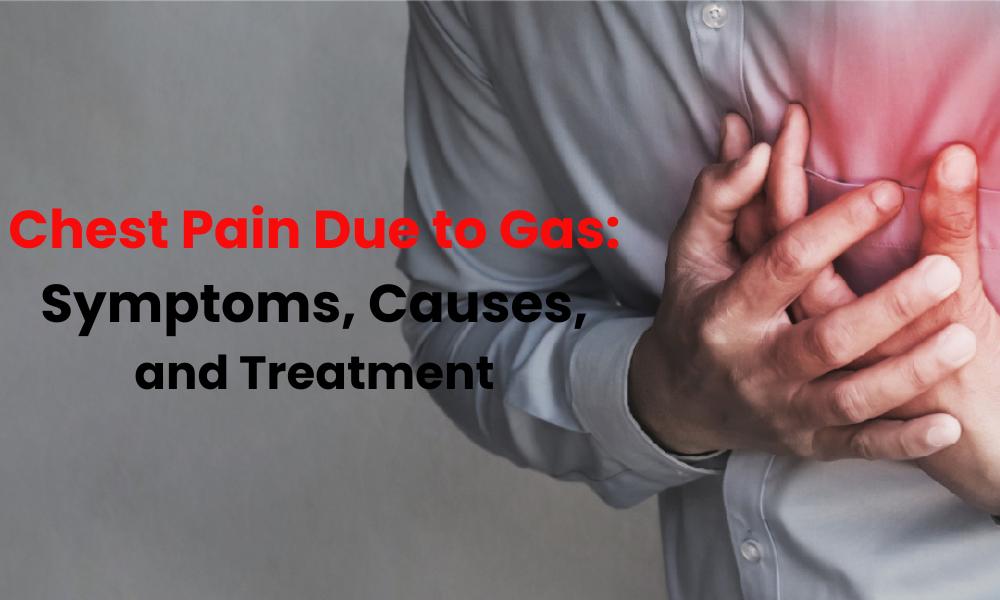


Chest pain due to gas, often mistaken for more severe conditions, is a common issue that many people experience. This discomfort, while usually benign, can be alarming, especially when it mimics symptoms of heart problems. Understanding the causes, symptoms, and treatment options for gas-induced chest pain is crucial for proper management and relief. This blog will guide you through the essential aspects of this condition, helping you distinguish between gas-related pain and other serious conditions.
Causes of Chest Pain Due to Gas
Chest pain from gas is typically a result of digestive disturbances. Here are some common causes:
- Swallowed Air: Eating or drinking too quickly, chewing gum, or talking while eating can lead to air swallowing, accumulating in the digestive tract and causes discomfort.
- Gas-Producing Foods: Certain foods like beans, onions, broccoli, cabbage, and carbonated drinks are known to produce excess gas during digestion, leading to bloating and chest pain.
- Digestive Disorders: Conditions such as Irritable Bowel Syndrome (IBS), gastroesophageal reflux disease (GERD), and inflammatory bowel disease (IBD) can contribute to gas buildup and associated chest discomfort.
- Overeating: Consuming large meals can overwhelm the digestive system, causing increased gas production and chest pain.
- Lactose Intolerance: Individuals who cannot digest lactose, a sugar found in dairy products, may experience gas and bloating, leading to chest discomfort.
- Constipation: A buildup of stool can cause bloating and pressure, resulting in gas-related chest pain.
- Stress and Anxiety: Emotional stress can impact digestion, increasing gas production and chest discomfort.
Symptoms of Chest Pain Due to Gas
Gas-related chest pain can manifest in various ways, often mimicking more severe conditions:
- Sharp or Stabbing Pain: A sudden, intense pain in the chest that may be localized or radiate to other areas.
- Pressure or Tightness: A feeling of heaviness or constriction in the chest, similar to heart-related pain.
- Bloating and Distension: Abdominal bloating with a full or tight feeling, contributing to chest discomfort.
- Burping or Belching: Frequent burping may temporarily relieve the pain by releasing built-up gas.
- Increased Discomfort After Eating: Symptoms tend to worsen after meals, particularly if gas-producing foods were consumed.
- Radiation to Shoulders or Back: Discomfort may extend to the shoulders or back, similar to pain from heart conditions.
- Relief with Passing Gas: Pain may decrease or resolve after passing gas, indicating its gastrointestinal origin.
Diagnosing Chest Pain Due to Gas
Diagnosing chest pain due to gas involves a careful evaluation to rule out more serious conditions, especially heart-related issues. A healthcare professional will typically conduct:
- Medical History and Physical Examination: To understand the pattern and triggers of your symptoms.
- Blood Tests: To check for signs of inflammation or other issues.
- Imaging Studies: X-rays, CT scans, or MRIs may be used to rule out other causes of chest pain.
- Electrocardiogram (ECG): To assess heart function and rule out cardiac issues.
- Esophageal pH Monitoring and Endoscopy: For patients with suspected GERD or other gastrointestinal issues.
For those experiencing persistent or severe chest pain, a visit to the best hospital in Varanasi is essential to ensure comprehensive evaluation and appropriate treatment.
Treatment for Chest Pain Due to Gas
Managing chest pain due to gas involves both short-term relief and long-term prevention:
- Over-the-Counter Medications:
- Antacids: To neutralize stomach acid and relieve heartburn.
- Simethicone: Helps break down gas bubbles, making it easier to expel gas.
- Dietary Adjustments:
- Avoid gas-producing foods.
- Eat smaller, more frequent meals.
- Chew food thoroughly to minimize swallowed air.
- Lifestyle Changes:
- Maintain good posture during and after meals.
- Stay active to promote digestion.
- Avoid lying down immediately after eating.
- Hydration:
- Drink plenty of water throughout the day.
- Limit caffeinated and alcoholic beverages.
- Stress Management:
- Practice relaxation techniques like deep breathing or yoga to reduce stress and its impact on digestion.
- Probiotics:
- These can help balance gut bacteria, potentially reducing gas and discomfort.
- Medical Procedures:
- In some cases, procedures like surgery or endoscopy may be necessary, particularly if GERD is a contributing factor.
Consulting with specialists at the best gastro hospital in Varanasi for personalised care and expert treatment can provide the guidance and support needed to manage and alleviate gas-related chest pain effectively.
Conclusion
Chest pain due to gas, while often benign, can cause significant discomfort and anxiety. By understanding the causes, symptoms, and treatment options, individuals can take proactive steps to manage this condition. Always consult with a healthcare professional, especially if the pain persists or intensifies, to ensure proper diagnosis and treatment. The best hospital in Varanasi is equipped to provide comprehensive care, ensuring your health and peace of mind.
Contact Us:
- Phone: +91-9695953111, 05422978222
- WhatsApp: +91-9151012715
- Visit: Amara Khaira Chak, Akhari bypass NH2, Varanasi
©
All Rights Reserved For Arvachin Hospital - Varanasi | Design By :
Digital Branding Corporation